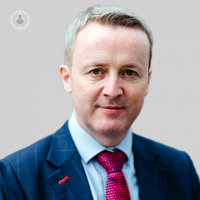Post-viral fatigue and COVID-19: what have we learnt so far?
Written by:We feared in March 2020 that many people recovering from COVID-19 would have prolonged symptoms. Now, it is clear that what we feared might be hundreds of people in this situation was an under-estimate and there are, in fact, thousands of “COVID long-haulers” still struggling with multiple symptoms.
We asked consultant rheumatologist and fatigue specialist, Dr Gerald Coakley, for an update on the situation and what his experience has been like so far treating patients with post-COVID fatigue.

What has your experience been of post-COVID fatigue?
Since April, an increasing number of people have come forward for help with persistent fatigue. Many have experienced a roller-coaster of symptoms and mood, from initial terror during the acute infection and associated period of strict self-isolation, to elation at surviving, and then despair as fatigue kicks in. In prolonged cases, this can reach the threshold for a diagnosis of chronic fatigue syndrome (CFS)/myalgic encephalomyelitis (ME).
A lot of the people I have seen managed to return to work and exercise early, only to have a relapse of symptoms taking them out of the workplace again, and are bewildered at how to proceed. Many have been assessed by their GPs or in emergency departments for their symptoms, and have had ongoing inflammation (“cytokine storm”) or thromboembolism (post-COVID blood clots) excluded with blood tests and imaging respectively. But having normal test results does not help with managing ongoing symptoms, and that is why people are reaching out for help.
What is new in our understanding of post-COVID fatigue?
Compared with where we were in March 2020, there has been some important progress. Professor Tim Spector at King’s College Hospital launched his COVID Symptom Study app with currently over 4 million subscribers and they are building up a picture of the 10 % of people who have symptoms for up to a month, and the 5% of who experience long-term symptoms including fatigue.
I would encourage anyone with long-term symptoms who has not yet done so to download the app and join the study because it represents a great opportunity to learn more about this strange disease. With current proven cases in the UK running at almost 300,000, it means around 15,000 new patients in the UK are likely to be suffering from ongoing post-viral symptoms, as well as large numbers who have been severely affected requiring stays on intensive care units who may need help with rehabilitation.
The NHS has launched two initiatives to improve our understanding of and provide care for people with long-term symptoms. The PHOSP-COVID study is launching this summer and will examine in detail patients who have been hospitalised with COVID-19 to gain a comprehensive picture of the impact on long-term health outcomes, including a panel of biomarkers. This is the kind of study people with CFS/ME have been demanding for decades and represents a huge opportunity. If you have been hospitalised with COVID-19, you may find your local NHS hospital invites you to participate in this study, and I would strongly encourage that so we can learn as much as possible.
To support people during their recovery from COVID-19, a new digital NHS service called Your COVID Recovery launched in late July 2020. Although aimed primarily at those hospitalised with the infection, the site has some very sensible advice and guidance for dealing with symptoms like fatigue, breathlessness, nightmares and flashbacks which have been raised as issues by many who have consulted me over the last few months. It will be supplemented during the autumn with regional teams to support those who need face-to-face or home-based rehabilitation.
I encourage ‘COVID long-haulers’ to read the sensible guidance from the UK’s Chartered Society of Physiotherapy and from the Royal College of Occupational Therapists. The latter also provides practical information on how to conserve your energy during and after having COVID-19.
What about people whose fatigue does not improve with the measures you have outlined?
It can take many months to recover fully and it is heartening to see services with sensible guidance like Your COVID Recovery being set up to support people in the UK. However, if there are persistent fatigue symptoms after 4 months that interfere with the capacity to carry out normal day-to-day activities and work, then I recommend a visit to the GP to consider referral to a specialist fatigue service.
It is important to stress that we still do not know the optimal way to manage post-COVID fatigue, but specialist fatigue services have experience of helping people to manage life and work despite ongoing fatigue, and to negotiate the right support from employers and access benefits, where relevant. For many, having the support of a team who understands how chronic fatigue can affect people is in itself therapeutic.
Dr Coakley has had helpful advice and support in managing post-viral fatigue patients and in thinking about post-COVID fatigue from the expert multi-disciplinary team at Vitality360.
Click here to get in touch with Dr Coakley and to receive care of the highest quality for chronic fatigue syndrome, fibromyalgia, rheumatoid arthritis, back pain and many more conditions.


